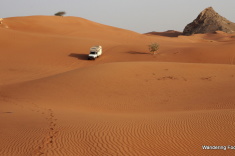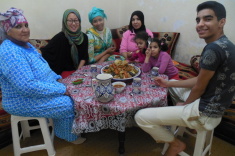This Overlanding Life is a series of blog posts about the practical side of long-term overland travel. The first post was on all things financial. We hope these posts will help give some insight to those curious about our lifestyle as well as some practical tips for those looking to create for themselves a full-travel nomadic existence. If you have any additional questions, please feel free to post them in the comments section below.
If money is the first thing people ask us about how we manage to travel full-time, questions about health and safety are almost always next.
What if you get sick? What if your vehicle breaks down in the middle of nowhere? Aren’t you scared of traveling in X country? We are often bombarded with questions about illness, accidents, car troubles, and personal safety while abroad – questions that, honestly, neither of us spend much time worrying about. However, we do understand that, for many, such questions require answers before they willing to embark on a full-time life on the road.
.jpg)
Oh crap, stuck in the mud again…
Here, we will do our best to answer common questions from our own experience and perspective. Our expertise is as two individuals who have spent over thirty years traveling abroad, not as doctors or consular officials. Feel free to take some advice and disregard other tidbits. But, whatever you do, please don’t take our advice as Law – they’re just opinions from two experienced travelers living the dream.
Health
With thirty years of travel under our belts, it would be surprising if our bill of health was totally clean. Between Bruno and me, we’ve had giardiasis, malaria (twice), kidney stones, a major car accident, and salmonella. We’ve experienced countless flues and colds. We’ve visited hospitals and doctors’ offices on every continent.
Yet, as I discussed in my Pink Pangea article, How I Avoid Getting Sick Abroad, contracting exotic illnesses isn’t as easy as you’d think! Though we have a water filter, we often drink tap water. We eat street food, even in India. We swim in questionable waters, including Africa’s bilharzia-infested Great Lakes. Yet we don’t get sick very often. Bruno and I may be reckless by some standards, but the point of my article is that it’s important not to let responsible caution turn into paralyzing paranoia.

Most of the time, I feel THIS good!
Exercising responsible caution means different things to different people. Here are our answers to common health questions:
Do you buy travel health insurance?
Almost always. Over the years, we’ve tried loads of different companies – from AVI Marco Polo (great, but we no longer qualify), IMG (we had a terrible experience), and ACS (haven’t had a claim yet). Neither of us has ever tried World Nomad, the travel insurance often recommended by long-term travelers, as well as Lonely Planet. Their quotes are consistently double the price of the other companies we’ve tried. We’re always able to keep our insurance costs under $50USD/month, even though Bruno is in the “over 50” category now.
It’s definitely worth shopping around before buying, and if you’re European or traveling in Europe, there are some very affordable options a Google search away! I’m currently with MondAssur because it provides me inexpensive coverage within Europe, where I expect to be most of the next year.
.jpg)
I’m definitely happy I had travel insurance here, because I had a concussion AND giardiasis at the same time!
We know a lot of long-term travelers that don’t buy health insurance at all. In certain regions of the world, we agree that paying the occasional cost of health care may be a better alternative than purchasing travel insurance. In Europe and North America, however, we definitely recommend buying yourself some peace of mind!
Do you get vaccinated?
Yes, but rarely. We have vaccination books that keep a record of all the travel-related vaccinations we’ve had. Early in our travels, we received a concoction of different vaccinations, but now we mostly stick with yellow fever. It is the only vaccination that is required when visiting certain countries (check, of course, before you travel) so we’ve had to keep that one up-to-date. I read recently, though, that next year they will start giving oral yellow fever vaccinations, which is useful for us trypanophobes!
Do you take anti-malarial prophylactics?
I took doxycycline when I studied abroad in Senegal for four months because it was required by my university. I felt “off” the entire time. When living in Zimbabwe, I occasionally took a one-time anti-malarial pill (available locally at the clinic) when the family I worked for brought me to a particularly infected region of the country. For the next two years, despite traveling in Southern and Eastern Africa, I refrained from taking prophylactics. Instead, I covered myself with proper clothing at peak mosquito hours and used mosquito repellent or candles if the bugs were particularly bad (a rarity, surprisingly). Avoiding bug bites felt like a safer anti-malarial strategy than taking prophylactics long-term, which has notable side-effects.

In a malaria-infested area like this, I occasionally took one-time prophylactics.
Bruno has never taken anti-malarial prophylactics, despite over twenty years on the road. He has, however, contracted malaria twice, both times in West African countries that are renowned for the risk. He knew the symptoms and so was able to get the care he needed quickly enough to recover without complications. According to him, malaria was bad, but as a healthy man with sufficient financial resources and a ready mode of transportation, he feels that traveling the world without taking prophylactics isn’t an unreasonable risk.
Do you drink tap water and eat street food?
Yes and yes. If the locals drink tap water, and it looks clear, we drink it. Sometimes we let it sit in the sun for several hours for UV treatment if it looked questionable. Nowadays, we do have a Katadyn filter, but we purchased it mostly to remove bad taste from water. We eat whatever street food looks yummy!
We think it’s good to adapt your body to these things – if you’re traveling long-term – because it strengthens your system. I mean, you don’t want to have to brush your teeth with bottled water every day, and you definitely want to get in on street food! You will get sick of course, but you’ll get less sick and less often over time.

CAN’T.NOT.EAT.STREET.FOOD.
What do you do when you get sick?
Ultimately, Bruno and I feel that dealing with health issues on the road is not much different from dealing with them at home. When we catch colds or flus, we relax inside our camping car, drink lots of fluids, use medications stored in our medicine cabinet under our bed, and wait to get better. When we get ill, we contact our travel health insurance companies for advice on what to do and where to seek help. They always have lists of expat-quality care around the world. If we were to be very ill, we’d take a taxi, ask a campsite receptionist, or use the internet to point us in the direction of the nearest hospital.
While the standard of health care isn’t consistent worldwide, it is almost always possible to find a private hospital or doctor’s office with modern equipment and care. And while it feels uncomfortable to be cared for in a language you can’t speak or in an unfamiliar environment, we’re happy to report we’ve never had a traumatizing hospital experience. Rest assured, the necessary resources are available worldwide to help you in case of illness or accident.

It’s no more fun being sick on the road as it is at home, but it’s no worse, either.
Overall, then, our health advice is to prepare for illness abroad, but not to let fear paralyze you from making the decision to live your dream. You WILL get sick at some point. And then you’ll use your resourcefulness to get the care you need.
Safety
Over the years, Bruno and I have done it all. We’ve driven off-road, in deserts, and in the deep dark bush of Africa. We’ve been to Saudi Arabia (where, by the way, I got very sick!), Sudan, and Iran. We’ve spent weeks in Nairobi and Johannesburg. We’ve bush-camped all around the world. I’ve lived in one city under siege and another one in the midst of a monarchy-takeover.
Yet, we’ve never encountered a problem. Sure, we had a close-call with the border officials in Oman, encountered a few strange people here and there, had a few flat tires, and got the vehicle stuck a few times. Each of us has been robbed once. But knock on wood, nothing dire has ever happened to us.

Our run-in with Omani border police. It all turned out ok.
We think people worry more about safety abroad than they need to, especially if that travel is going to happen anywhere outside of North America or Europe. There are a few misconceptions about safety and travel outside the green zone we’d like to clear up.
1. The world is safer than your television tells you. For the past few years, Bruno and I have traveled through Africa and the Middle East, two continents that have a very bad safety rap. Yet our experiences in these regions have been overwhelmingly positive, and we’re so happy we didn’t let the media dictate our views on these regions. We felt so welcome and safe in the Middle East, especially, that I felt inspired to write a thank-you letter to the Arabian Peninsula. It’s funny that I have never felt as vulnerable as when I would walk home late at night while living in my own country’s capital, and that the only time I’ve ever been threatened by someone was in Paris.

Mechanics in many countries are cheap and incredibly resourceful!
2. You can travel overland even if you’re not a mechanic. Car troubles are an inevitable part of overland travel (unless you have a 1988 Toyota Land Cruiser, that is!). Yes, it’s helpful to know a thing or two about engines and suspensions and breaks, but it’s not as imperative as you think. There is always someone there to help. In Africa, we’d stop in seemingly isolated places, and people would pop out from behind bushes and hills within minutes. In the Middle East, whenever we’d get caught in the sand, I could snap my fingers and a group of men would miraculously show up to help us out. In most of the third-world, car mechanics can do wonders with very little material, and they cost a fraction of what a repair in Europe or North America would cost.
3. You can get good emergency medical care in the third world. Ok, I’m not going to lie that calling an ambulance isn’t always as easy as simply dialling 911 and waiting a few minutes. But even in countries without public emergency health care there are private companies that can help in emergencies if you do a little research. Bruno’s only car accident was in Pakistan, and it was a bad one (he should have died). Instead, he woke up in a hospital being overseen by an anonymous local man who’d taken it upon himself to act as a guardian angel for this unfortunate visitor. Because of the care he received, Bruno walked away from the accident with only a few scars.

Help is always on the way!
As with health, it’s a good idea to exercise caution when traveling abroad in order to remain as safe as possible. Here is our quick list of advice to limit safety risks during travel:
1. Do your research before choosing a destination. Visit online forums of people who’ve recently been to the country you’re eyeing. If you’re in a nearby country, talk to other travelers, guesthouse owners, and travel agents. Don’t pay too much heed to official government website warnings – they are unnecessarily cautious.
2. Be reasonable in your destination choices. We didn’t visit Syria this trip, or even the Democratic Republic of Congo. But we did decide to go to Burundi last year (before things got bad again) based on our on-the-ground research. We don’t play daredevil with our destination choices because there are plenty of amazing safe countries to visit.

We felt safe going to Burundi because we did on-the-ground up-to-date research. And it was great!
3. Let someone know where you are. That might be an embassy (you can register with your country’s embassy if you want, though we never do) or it might be your mom (that’s what we do). There are even new GPS technologies you can buy that can send an SOS signal to someone with your exact location.
4. Limit your risks. Avoid going out late at night, sidestep shady parts of town, and limit time in cities (where most safety risks exist). Drink responsibly, or drink in your hotel or campsite. Don’t leave valuables out, and don’t wear too much bling-bling. You get the idea.
5. Listen to your inner-radar. If you’re getting a weird vibe from a person or place, listen to your gut. If the bungee-jump rope you’re tied to looks ratty, untie yourself. Again, you get the idea.

This Omani man may have been weird, but our inner radar told us he was harmless.
6. Recognize that your safety risks abroad are similar to those at home. So, don’t do anything abroad that you wouldn’t do in your own country!
To sum up today’s very long post: most of the health and safety questions we get come down to “What if…?” questions. While it’s valuable to consider the possible scenarios you might find yourself in so that you can mentally prepare your reactions, at the end of the day, throw your “what if” questions out the window. Don’t worry too much – you’ll figure it out when you need to.


